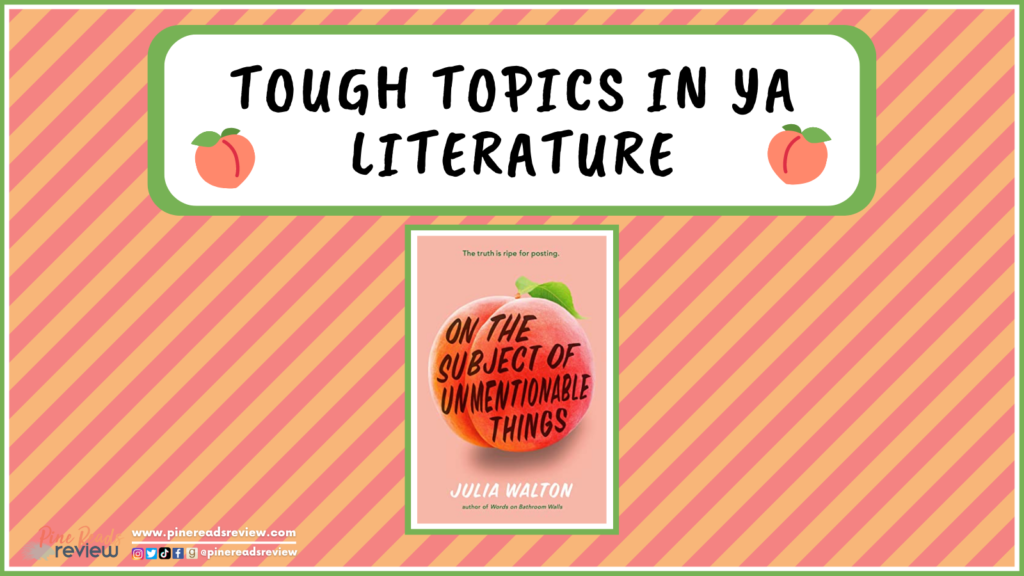
Julia Walton aims to write about conventionally hard issues to tackle in YA books getting into the nitty gritty of everything having to do with sex.
Usually, YA books stray away from the topic of sex. Writing about such a notoriously inappropriate topic to young audiences is anything but easy. Traditionally, in young adult books, authors avoid depicting sex usually only going as far as narrating a simple kiss. That’s why when I heard that Julia Walton- the author of Words on Bathroom Walls– published a book about the sex education of youth I was immediately intrigued. The book is entitled “On the Subject of Unmentionable Things,” the title inscribed on the graphic of a giant peach that eats up almost the entire cover- definitely an attention grabber.
The book follows the female protagonist Phoebe Townsend, a 16-year-old girl tackling the issues she has with her high school’s lack of sexual education in her small town. She sets out and publishes an anonymous blog on Twitter that she names “The Circle in the Square”- a play on a condom. She writes under the pen name Pom and answers questions about sex in a brutally honest way. What makes Phoebe stand out is she is a virgin who just has a research fixation on everything her high school’s sexual education is leaving out such as female masturbation, sex amongst the LGBTQ+ community, contraceptives, and so on.
However, this story takes a turn into an immense political debate when mayoral candidate Lydia Brookhurst has something to say about Phoebe’s blog. She calls out the blog for corrupting the youth pointing out the author for being a “sexual pervert.” The book quickly spirals as sides are split between the conservative nature of parents wanting to protect their kids from sex and the kids that are desperate for information that is not accessible to them. All while this is happening we experience the love story of Jorge and Phoebe.
Jorge is the perfect combination of the nerdy jock, a starting football player at her school with a secret fascination with the research of plants. Hence, when Phoebe is chosen to interview him for an article for her school paper the two had chemistry immediately. A subplot-line involved a love triangle between Phoebe, Jorge, and Neil. Neil is the editor for the paper Phoebe writes for. However, after one sloppy kiss between Neil and Phoebe, she realized she wanted Jorge. Jorge stole our hearts with his characterization.
While Phoebe experiences her love endeavors, Pom has to navigate the world of politics, sexual advice, and cancel culture. The book comes to a crash and burn once Phoebe’s identity is revealed by the political candidate Lydia Brookhurst during her political speech. The crowd, as well as Brookhurst, referred to the blog’s author as a “him” so after the reveal that the author was a 16-year-old girl the crowd was shocked. The identification caused strain on Phoebe’s relationship. She also was a victim of bullying, demonstrating how it is hard for women to be sex-positive without being slut shamed.
Like any good story, after tackling her anonymity being compromised, Phoebe navigates her platform by standing up to her haters. She learns to love the voice behind her name. Jorge comes to terms with Phoebe’s passions and fixes their relationship. Phoebe gains an even bigger platform, resulting in her getting an agent as well as a book deal.
The final scene is striking, she and Jorge have sex and she ends the book saying that she does enjoy sex which might even be more scandalous than the blog itself.
“Or maybe I wrote the blog because I believed it wasn’t something I was supposed to write. Those all be true in part, but I now would also have to add:
Because I enjoy sex.
Which might be even more scandalous.”
-Walton, 209
I felt this book was powerful, timely, and appropriate. Despite living in a generation where the topic of sex is more embraced, as a female it is still a taboo topic to write about. I believe Walton did an amazing job conveying sexual education through the plotline. She has the gift of tackling subjects that often make young readers squirm. Walton makes the reader feel comfortable talking about sex itself. I felt at times the political plotline of an adult woman coming for the character of a 16-year-old was not convincing. Since, in reality, I cannot see a grown woman attempting to ruin a child’s life. However, the debate of outdated opinions of sex versus this generation was voiced throughout the characterization of Phoebe vs. Brookhurst.
What I especially enjoyed about Walton’s novel was the discussion of gender stereotypes- how the audience assumed the blog writer was a male simply because the author knew about sex. And then, once Phoebe’s identity was uncovered, everyone knew it was female writing about sex. Since she was a female, she got bullied for being a “slut.” I find this incredibly important because especially in a high school setting any female that openly talks about the enjoyment of sex is labeled as a “slut.” I found the discussions of sexuality and gender shown through the characterization of Phoebe incredibly relevant.
My favorite part of the book was the final chapter. I felt this way because of Walton’s ease to narrate a sex scene without sounding raunchy. I was also touched by Phoebe’s inner dialogue about how she comes to terms with liking sex after getting shunned by society. I felt the dialogue was empowering and essential as a woman in this society.
I read this 312-page book in one sitting! If I were to ever be a mother I would encourage my child to read this book to know that sex is an okay topic to talk about in adolescence, especially as a female. Walton can write page-turning novels while still grappling with important issues.
PRR Writer, Grace Katich